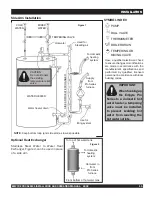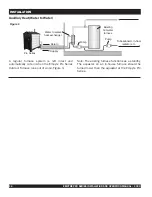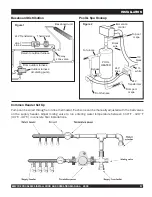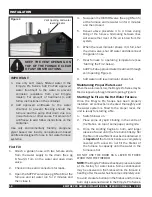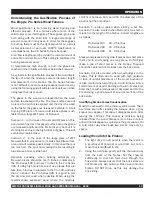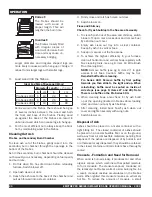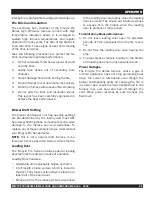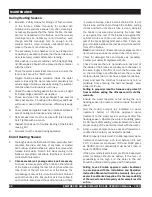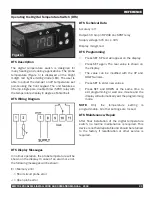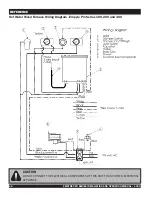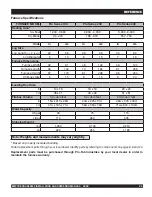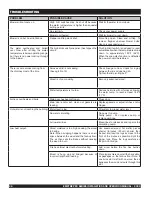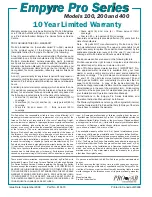
EMPYRE PRO SERIES INSTALLATION AND OPERATION MANUAL • 2009
19
OPERATION
Understanding the Gasification Process of
the Empyre Pro Series Wood Furnace
Wood gasification is an amazing clean burning and
efficient process! It is a process where much of the
solid fuel is converted to gases. These gases ignite and
burn along with the solid fuel. A large percentage of
wood is converted into gases. In order for these gases
to burn up there must be the right amount of air, as well
as temperatures of well over 1000ºF. Gasification is
accomplished in the Pro Series furnace because:
a) air flow is engineered to provide the correct amount of
under fire and over fire air. This setting is calibrated for
burning seasoned wood;
b) temperatures high enough to burn the gases are
reached in the insulated chamber below the firewood.
A key factor in the gasification process is the wood itself,
the type of wood, the moisture content, diameter, length
and placement in the firebox. The Pro Series furnace
is not difficult to operate using seasoned wood and by
using the following guide it will also work well even when
using less than ideal wood.
The gases in the wood are released when the wood
surface is exposed to the fire. The more surface area of
a piece of wood that is exposed and the drier the wood
is, the faster the gases are released. Example: A small
burning DRY piece of firewood will release gases much
faster than a large WET piece of firewood.
Scenario 1: in the case of the small DRY piece of fire
wood which has lots of exposed surface area the gases
are released rapidly and the fire burns very hot but it is
starving for air due to the high volume of gases. This will
eventually create smoke.
Scenario 2: in the case of the large piece of WET
firewood that in proportion to its mass has little surface
area and will release gases slowly. In this case there is
too much air. The air is now cooling the fire resulting in
blue smoke and very little heat.
Generally speaking, when burning extremely dry
firewood, pieces should be over 5 inches in diameter in
the Pro Series 100, and over 7 inches in the Pro Series
400. If using high moisture wood, use pieces that are
less than 5 inches in diameter in the Pro 100, and less
than 7 inches in the Pro Series 400. It is good to mix
the dry and wet wood when possible. When using the
recommended seasoned wood where the moisture
content is between 19% and 25% the diameter of the
wood is not that important.
Scenario 1 is also created when stirring a hot fire.
Scenario 2 is also created when firewood is too short in
relation to the length of the firebox. Correct lengths are
as follows:
Pro Series 100 20 - 25 inches
Pro Series 200 24 - 28 inches
Pro Series 400 31 - 36 inches
Stack wood pieces side by side. If pieces are short place
them end to end making one long piece. Do NOT just
make a pile of short pieces in the firebox. Firewood
should be centered front to back over the brick slots.
Scenario 2 is also created when wood bridges in the
firebox. This is often due to wood with high moisture
or lack of careful placement of the wood. Scenario 2
is also created when starting up a cold furnace. Only a
small amount of wood is burning with a lot of excess air.
Start the fire with small pieces of dry wood and stir the
fire ensuring a good amount of wood is over ALL of the
brick slots.
Identifying Smoke Verses Condensation
Mostly the exhaust from the chimney will be clear. There
are times soon after loading the furnace when a gray
vapour may appear. This vapour disappears soon after
leaving the chimney. This vapour is moisture being
released from the wood. Smoke is more blue in colour
and will not disappear as quickly as the gray vapour. On
a cold winter day what looks like smoke may only be
vapour.
Loading Wood into the Firebox
1. The right time to add wood is when there still is
a good layer of charcoal or wood left, but not so
much that it is difficult to stir.
2. Using the ash rake, gently pull the charcoal away
from the back of the firebox. Stir the charcoal
sufficiently so that ash falls down through the
brick slots. Always ensure that the brick slots are
not blocked by ash build-up. Place wood into the
firebox, DO NOT throw, as this may damage the
brick lining.
Summary of Contents for Pro Series 100
Page 2: ......











